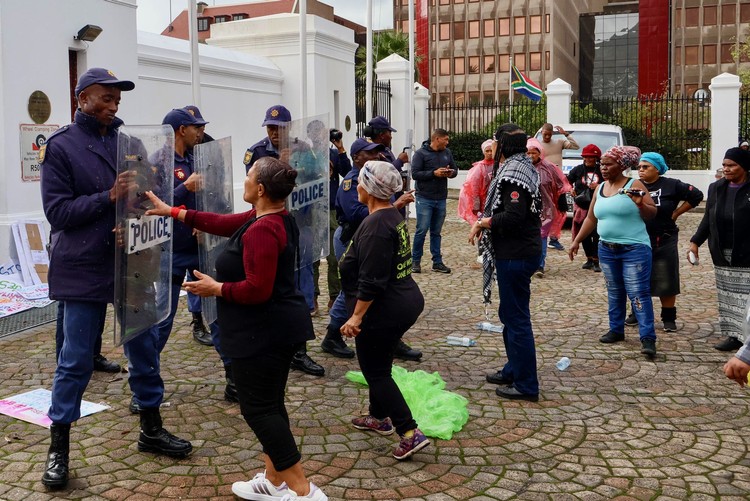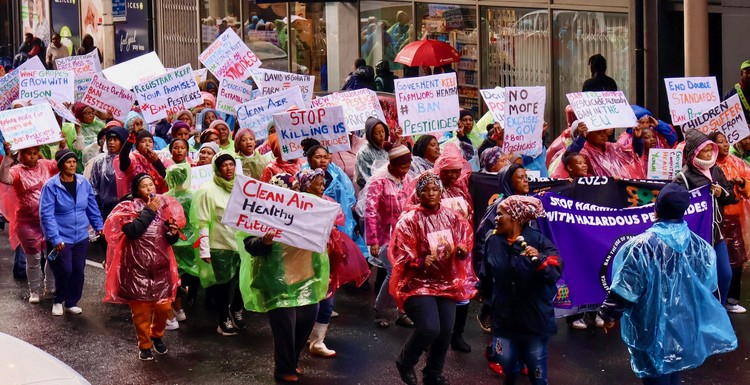Stun grenades thrown at farm women outside Parliament
200 women were marching to call for a ban on pesticides
Farm women and police officers face off after the protestors broke the police line and had stun grenades thrown at them. Photos: Liezl Human
- Farm women marched to Parliament on Tuesday in response to government’s decision not to phase out pesticides, as promised.
- Instead the Department of Agriculture, Land Reform and Rural Development has gazetted guidelines for exemptions on pesticide use.
- The farm workers want a ban on pesticides widely used in South Africa but banned elsewhere in the world.
- Stun grenades were thrown at the women outside Parliament when they breached the police line.
Over 200 farm women braved the rain and cold to march to Parliament in Cape Town on Tuesday.
Under the banner of the Women on Farms Project (WFP), they carried placards that read: “Don’t poison us” and “Ban pesticides now”.
The protest was over a decision by the Department of Agriculture, Land Reform and Rural Development to renege on a promise to phase out harmful pesticides by June 2024.
Police threw stun grenades at the women after they broke past the police line at the gates of Parliament. Some women threw their placards over the gates, some of which were thrown back. They also threw water at the police. Using their shields, police pushed the women back.
In April 2022, the department gave notice that certain pesticides, including chemicals linked to cancer, genetic mutations, and harmful to reproductive health, would be phased out and banned by this month.
In September 2022, we reported that the department was in talks with the industry about this.
But instead of phasing out pesticides, the department recently gazetted guidelines for applicants to apply for “derogation” of a “substance of concern” and be granted an exemption to use the pesticides.
In a memorandum, the Women on Farms Project (WFP) said the guidelines do not provide the criteria the department’s registrar will use to decide on the registration of pesticides; that there is an “unreasonably short” period of 30 days to provide any comments on applications; and that there is no appeals process for interested parties, such as farm workers, after a decision is made.
“This move allows rich, resourced, and powerful corporations to undermine the safety and well-being of our agricultural workers and communities,” the memorandum reads.
The memorandum demands that pesticides already banned in the EU also be banned in South Africa, and that the registrar, Jonathan Madzunga, meet with the workers urgently.
The farm women say the new regulations were made without consulting them.
Colette Solomon, director at WFP, said farm workers have been “totally excluded now from the decision-making”. They “feel like their health interests have been totally overlooked”.
“To us it really does seem like it is a buckling of government to the interests of commercial farmers and, more importantly, to pesticide companies,” said Solomon.
“We won’t let them forget about the most important people in the equation – farm workers and dwellers,” she told the crowd.
Seasonal farm worker Engela Masobeng said: “You work here and right there the tractor is spraying.” If farm workers can grow crops without pesticides, then farmers also can, she said.
No one received the memorandum at Parliament.
The Department of Agriculture, Land Reform and Rural Development had not responded to GroundUp’s questions at the time of publication.
On Tuesday 4 June, under the banner of the Women on Farms Project, about 200 women marched to Parliament calling on government to ban the use of pesticides that are already banned in the EU.
Support independent journalism
Donate using Payfast

Don't miss out on the latest news
We respect your privacy, and promise we won't spam you.
Next: Thousands of special needs learners still not placed at schools
Previous: Public Protector releases damning report on the handling of gender-based violence complaints
Letters
Dear Editor
These women have a strong point. And it is just ignored? People in Somerset West and areas where pesticides are used suffer from the effect of agricultural pesticides. We get sick and suffer from terrible allergies. How much more so for people working on the lands and living in close proximity to the vineyards or fruit trees?
There should be other ways to deal with pests.
And then, wow! Police use stun grenades on women. What a shame!
Dear Editor
Here we see a few non-militant women protesting for the protection of their children and families, and the police acting brutally against them. What a shame. Could the minister or senior official not have gone out to talk to them and undertake to revisit the banning of these harmful chemicals? Or are palms being greased by the big Chem companies?
Shameful!
© 2024 GroundUp. This article is licensed under a Creative Commons Attribution-NoDerivatives 4.0 International License.
You may republish this article, so long as you credit the authors and GroundUp, and do not change the text. Please include a link back to the original article.
We put an invisible pixel in the article so that we can count traffic to republishers. All analytics tools are solely on our servers. We do not give our logs to any third party. Logs are deleted after two weeks. We do not use any IP address identifying information except to count regional traffic. We are solely interested in counting hits, not tracking users. If you republish, please do not delete the invisible pixel.


